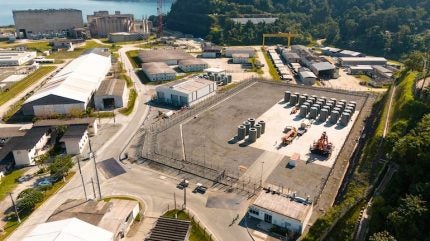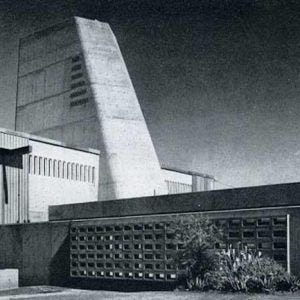
Brazil’s National Nuclear Energy Commission (CNEN – Comissào National de Energia Nuclear) has been granted a 40-year extendable permit for operation of the Complementary Dry Storage Unit for Used Fuel (UAS – Unidade de Armazenamento Complementar a Seco de Combustível Irradiado) at the Angra NPP site. The Angra plant comprises two different reactor units. Angra 1 is a Westinghouse-designed 609 MWe pressurised water reactor (PWR), while Angra 2 is a Siemens-designed 1275 MWe PWR. The used fuel storage pools at both units are approaching full capacity. The initial operation authorisation of the UAS was issued to nuclear utility Eletronuclear in 2021.
The unit is designed to hold up to 72 Holtec Hi-Storm FW dry storage casks, with the capacity to receive fuel until 2045. During the first fuel transfer campaign, held between 2021 and 2022, 15 storage casks were taken to the site. In the initial phase of the second campaign, completed in August 2024, 15 more units were added. After the completion of this phase, which will deal with fuel from Angra unit 1 in 2025 and 2026, the number of storage casks will total 48.
In the announcement published in the Official Gazette, CNEN said assessments had shown there was “sufficient guarantee that the operation … can be conducted without undue risk to the safety of workers, the public and the environment with regard to the areas of nuclear technical safety, radiological protection and physical protection of facilities and materials”.
Eletronuclear stressed that used fuels are not considered to be radioactive waste, as they still have significant energy potential which can be reused in the future.
The storage facility is designed to receive fuel elements from the cooling pools of both units. Under a turnkey contract signed in 2017, US Holtec supplied Eletronuclear with Hi-Storm FW systems and related equipment for dry storage of used fuel from Angra 1&2. Because the units have different architectures and licencing bases, Holtec modified their respective cask handling cranes and equipment for loading the fuel into the multi-purpose canisters, and for moving the canisters to the dry storage facility.
CEO Raul Lycurgo said: “This is an important milestone for Eletronuclear and the Brazilian nuclear sector. It confirms that, with respect to the most stringent safety and efficiency standards, we are ready to ensure the safe storage of spent fuels and continue our commitment to generating clean and sustainable energy for Brazil. The operation of the UAS not only ensures the safety of the facilities but also reinforces the role of nuclear energy in the national energy matrix, with the potential for future reuse of used fuels.”






